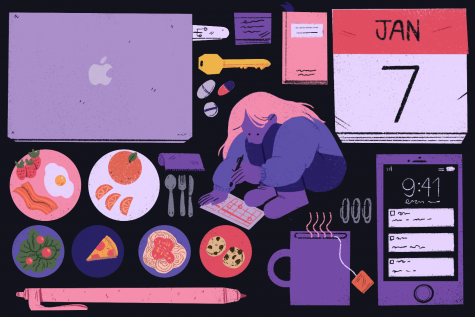Opinion: Living with an eating disorder during a pandemic, how a simple routine is essential
February 19, 2021

When I pitched a story for the second time about how people with eating disorders are handling the stay-at-home mandate, my editors asked what my sources were, and I wanted to say: “I am unwell.”
I have spent the last eleven months trying to put together something tangible and slightly encompassing of the difficulties of living with an eating disorder during an ongoing pandemic.
As we approach National Eating Disorder Awareness Week on Monday, Feb. 22, I am reminded that every year my memory wanders back to the beginning, forcing me to grab a pen and put something on the page.
There is no exact moment to point to, but it feels right to say my disorder began nine years ago.
I started to worry about the food I was putting in my body in early high school. I refused the pizza my parents ordered for dinner, the salad with full-fat dressing on the restaurant menu and the glass of sugar-filled Panera green tea during a trip to the mall.
It wasn’t clear to me until many years later that these were clear signs of orthorexia, or an unhealthy focus on eating in a healthy way.
As I sat down and began writing about spending the last year in quarantine, I felt the need to talk to someone else who understood.
Jax Connelly, a graduate student in the English and Creative Writing Department’s nonfiction program, has suffered from a range of eating disorders, including exercise bulimia—or extreme pathologic exercise behavior—and bulimia.
“Then many years later, it kind of dipped into anorexia territory,” Connelly said in a September interview with the Chronicle.
Before the pandemic, I stuck to a very clear-cut weekday routine. I woke up at a certain time to get ready for work and class, made a list on my phone of all the things I needed to get done on campus and planned my dinner for when I would finally be back home that night.
Routines and schedules have kept my eating disorder at bay in the past. But as we reach nearly a year of working from home, I do not have the same sense of control.
Connelly said they believe any sense of control we have right now is an illusion.
“That’s why there is satisfaction in this sort of nihilist approach to being like, ‘Yeah, I’m gonna make this stupid schedule for myself,'” Connelly said. “Which is essentially meaningless because nobody else besides me is getting anything out of this, and this isn’t an obligation or requirement I have to anyone else, but it gives me some kind of structure.”
Every morning, I light a candle and heat up hot water. I squeeze a lemon and gulp the burning, sour water down. I sweep the cat litter from the floor and cover dairy-free yogurt with granola. I grade student work. I sit in the corner of the couch and turn the pages of a book and wait for Chronicle articles to make it to my desk.
This is my new routine—something that allows me to focus on anything other than my body and the space it takes up.
Connelly watches a lot of Radiohead music videos and takes a lot of showers.
Now that the semester has started and we are both teaching, going to class or working on our thesis, getting back some sense of control is more manageable.
It is helpful to have things that must be done instead of creating notes on my phone like:
9: Make breakfast (tofu scramble), 10: Water the plants, 10:30: Clean the kitchen,12:30: Read for an hour, 1:30: Make lunch (avocado toast), 2:30: Write and so on.
For Connelly, the start of the semester has provided them with an “externally-imposed” schedule that keeps them on track.
“I was literally planning out every hour of my day on a little piece of paper,” Connelly said. “Whether that was like I’m going to wake up and walk my dog and then I’m going to go for a run, … things that I recognize I don’t have to be doing, … but when I don’t do that kind of excruciatingly detailed hour-by-hour plan, I start to unravel a little bit.”
While our routines have shifted and we have learned to manage over time, living with an eating disorder is an ever-present battle.
It is hard to specify what being “recovered” means because there is no real recovery—there is only learning how to manage and live with your disorder in a way that does not completely consume you.
Whenever I catch my reflection in the glass of a restaurant window on the way to the bookstore, I find myself whispering a phrase from author Roxane Gay’s “Not that Bad: Dispatches from Rape Culture”: “I am a body. I have a body.”
In the morning in bed, “I am a body. I have a body.” While I cut tofu for lunch, “I am a body. I have a body.” In the bathroom mirror as I rub lotion into my cheeks, “I am a body. I have a body.”
The distinction between these phrases is important to my own restoration.
For information on eating disorders and where to find treatment, visit the National Eating Disorder Association’s website.







